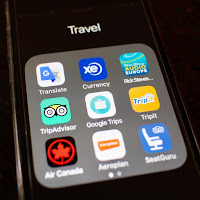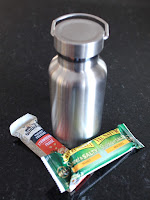Travel and Leisure
 |
| On safari in Zimbabwe |
As I had mentioned in
the last post, I've travelled to quite a few states in the US, Central America, the Caribbean, many European countries, and even down to West Africa and Zimbabwe. For the most part, my trips have been relatively issue-free, but I have had some bumps along the way, and learned a few lessons from them. So continuing on with my list, again with in no particular order of importance.
Download apps and files at home
Unless you have a great international roaming plan for your smart phone or device, you don't want to rely on the Wi-Fi at your international hotel to get that critical travel app. And you certainly don't want to try streaming Netflix over that connection either, so you'll want to download movies and shows before you leave home. Of course you can get a SIM card when you arrive at your destination, often for only €10 or so, and use the LTE data. But one time in Rome, I managed to use up my allotted data entitlement in a matter of minutes, by downloading an audio touring app for my iPhone, and a bunch of free walking tours. Luckily, the Wi-Fi at the bed and breakfast we were staying at was very good, so we weren't too inconvenienced by it.
Check for local/regional affairs and issues
While it's not always obvious to travellers what could be happening at your destination, it is a good idea to ask a local or check the news as to anything that might be pose a challenge. Things like local holidays or celebrations might want you to re-think your itinerary so that you don't end up in a small town with all of the shops and restaurants closed up. Or like the time in Rome, when we left a visit to Ostia Antica to our last day, only to arrive at the Metro station and find that a rotating transit strike was affecting that one route! It would have been a very inexpensive day trip by Metro, but with an expensive taxi ride as pretty much our only option left to get there, we ended up staying in Rome instead (which is never really a bad thing). Had we known that they publish the rotating strike and which routes were closed, we could have avoided this issue entirely however.
Do some pre-navigation before you arrive
Unless you are taking a taxi from the airport to your hotel, this one might help save some anguish for you. Next time you step out of a train or Metro station, have a look around at some of the other travellers. There will be at least a few that are standing there, luggage in hand, with no idea which direction to go. Often, there is a choice as to which side of the tube station to exit from, so there's a 50/50 chance you'll get it right. Trust me, we've walked a couple of blocks in the wrong direction numerous times, before the blue dot showed us moving the wrong way. But with the advent of Google Maps' street view, it's brilliantly simple to "virtually navigate" to your destination. A long time ago, prior to the advent of smart phones and GPS, we stepped off the bus in Toledo (Spain, not Ohio), and we both looked at each other, "which way now?". We spent the next hour or so, in the mid-day heat, wandering the maze of streets, searching for our little boutique hotel. She laughs about it now, but it was not a fun experience for me.

So on a recent visit to Brussels, I had a look on Google Maps as to where our hotel was w.r.t. the Brussels-Centraal Station. The walking directions showed a semi-circular building that we should see when we exited the station, so I clicked on the Street View to see a preview of what we should look for. When we got there, and walked out of the station, and she said, "Which way?" - I knew exactly where to go.
Use the bathroom when you can

Or as my friend likes to say, "Never pass up the opportunity to pee". You'd think this one would be obvious, right? Especially when you are not sure where and when the opportunity for a bathroom break will occur. But sometimes, you body doesn't seem to have the urge, and you pass on using the WC. Like the time when I was working at the Canadian Embassy in Mexico City. On Friday afternoons, there is a social hour at the end of the day, where they serve tamales and cervezas. But after having a few beers, it was time to head to the airport. Well you can guess what happens next. Rush hour in Mexico City is like nothing you've ever seen before. By the time we got to the airport, I was as close to peeing my pants as I have ever been! Anyhow, if you do end up getting caught with a full bladder while out touring in the city, a good place to find relief is a major chain-style hotel - there will always be a restroom in the lobby, typically near the bar or restaurant. It also won't cost you anything to use the loo there, as it will if you go to one of the public restroom facilities.
Carry a water bottle and a snack
I've learned this one from my wife, who has notoriously high metabolism, and
needs to snack in-between meals. But the reason why this one shows up on my mistakes list, is that you tend to make bad restaurant decisions when you are hungry. Like the time we were day-touring in Porto, we were all hot and tired, but rather than take our time finding a TripAdvisor-recommended restaurant, we settled on the first place we could find that served food and cold drinks. Needless to say, the meal was definitely not a highlight, which Portuguese meals should be. Being able to reach into your day bag and grabbing some nuts or a piece of fruit can give you that little boost of energy to get you out of the tourist zone, and allow you to find a memorable place to eat. As a general rule, you typically will get a better meal, at a lower price, if you walk about 5-10 mins. away from the busy tourist zone.
Lookup the local restaurant hours and mealtimes
Further to the above tip, the typical dining hours vary significantly by country and locale. Living in large, North American cities, most people expect that you can pretty much get a decent meal, any time of day or night. But trust me, you can't get a worthwhile dinner before 8 pm in Spain, and don't even try during siesta time. This becomes especially important when your body is still operating on Pacific time, but you're looking for something to eat in Budapest. While she would prefer to avoid eating in pubs or bars, sometimes that can be the only option available when you need to eat at 6 pm in Europe. Or the time that we arrived at Kahului airport around 8 pm - by the time we picked up our rental car and drove around to the other side of Maui, all of the restaurants over there were closed! Had we known, we would have had dinner in Kahului, before setting out for Napili.
Know your limits
When I was younger, I thought I was invincible; I didn't bother with things like travel insurance, and didn't think twice about doing virtually any activity that was part of my itinerary. But I had a wake-up call when I blew my achilles tendon while playing tennis in my 30s. All of a sudden, I had a heightened awareness that maybe, just maybe, bad things could happen to me. And I'm not referring to "accidents" that may occur - anyone can get hit by a car crossing the street. No, what I mean by knowing your limits, is figuring out what might just be a little too much for you.
 |
| Day 2 Saas-Fee - smiling because I'm not suffering from the altitude |
My example was the ski trip with my college mates to Saas-Fee, in the Swiss Alps. The town itself sits at 1,800 metres (5,900 ft), and the Metro Alpin funicular will drop you off a chest-wheezing 3,550 metres (11,647 ft). We flew on the red-eye arriving in Zurich at 6:30 am, immediately took the train to Visp, and the bus to the town dropped us off around 9:30 am. We were on the first lift by 10:30 am, and enjoying our first pint by noon. A few more runs at high altitude, and my head was pounding and spinning as we sat down for lunch at Spielboden. Now I'm not sure if I wouldn't have suffered if I'd done things differently, but I certainly would have taken more steps to stay hydrated while travelling, and perhaps gone a bit easier on the alcohol consumption on Day 1. But I learned a lesson on that trip - I am not (and never was) Superman.












